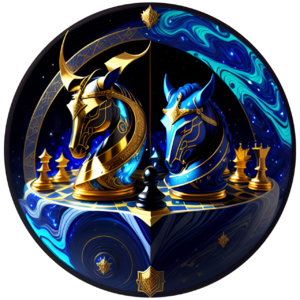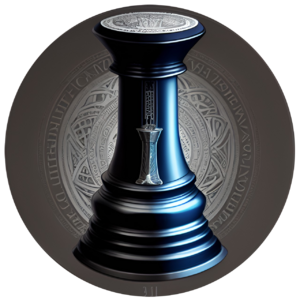Sayntesinner (talk | contribs) No edit summary |
No edit summary |
||
| Line 1: | Line 1: | ||
[[File:midnight-riders.png|thumb]] | [[File:midnight-riders.png|thumb]] | ||
[[File:midnight-riders-signet.png|thumb|Signet]] | [[File:midnight-riders-signet.png|thumb|Signet]] | ||
The Midnight Riders are a loose association of like-minded individuals working freelance throughout known (and at times uncharted) space. The group operates independently or in small cells, all striving towards a common goal. Their core belief revolves around the idea that one can never have too much knowledge. They believe that knowledge leads to strength, and with that strength comes the responsibility to combat corruption both within and outside their ranks. While the group is not widely publicized, it is not a secret either. Due to its decentralized nature, the group remains incredibly resilient to outside influence. | |||
== Key Tenets == | |||
The following principles are not laws but rather guidelines for the group. Each member is expected to uphold these principles rather than adhere rigidly to their literal interpretation. The aim is for these principles to serve as flexible ideals to aspire towards. | |||
== Key | * Do not judge the weaknesses of others, for none of us are mighty without our own weaknesses. | ||
The following are not laws for the group | * Defend the weak, the poor, and the hopeless, as these actions foster hope and kindness. | ||
* | * Value honesty above all else and never betray the trust others place in your word. | ||
* Defend the weak, the poor, and the hopeless | * Seek knowledge, for it brings strength, and share your knowledge openly with all. | ||
* | * Stand as a champion of righteousness and goodness, shining the light of knowledge upon the darkness caused by ignorance, injustice, and the lies of evil. | ||
* | * Show neither cruelty nor cowardice in your endeavors, and never shy away from a necessary fight. | ||
* | * Do not fight for personal gain; instead, fight for those who cannot fight for themselves, without succumbing to vanity, anger, or hate. | ||
* | |||
* | |||
* Never turn away, never turn your back, and never refuse to face the truth. | * Never turn away, never turn your back, and never refuse to face the truth. | ||
== | == Symbolism == | ||
The group strongly identifies with the traditions of old | The group strongly identifies with the traditions of old English knights from the 12th and 13th centuries, as well as the ideals of the Italian Renaissance man from the 14th to 17th centuries and the Greek ideal from ancient Greece. These beliefs emphasize the importance of education not only in the mind but also in spirit and body. Consequently, the symbol of the chess piece "Knight" holds great significance for the group, as do symbols of books, particularly journals with a red bookmark. This symbolism stems from the use of a red ribbon attached to the bindings of many journals, serving as a marker of the writer's last entry. | ||
Additionally, the group commonly associates itself with the Knight playing card from certain decks and the Knight of Swords from various Tarot decks. | |||
== | == Practices == | ||
Members of the group | Members of the group share certain habits and tendencies. They are typically free-spirited individuals who dislike conforming to the will of others. While many may conform to some extent in their professional lives, it is not uncommon for them to quickly rise to positions of authority and maintain a level of autonomy. Members also believe that leadership involves allowing subordinates to perform their tasks in the manner they see fit, aligning with their philosophy of individual autonomy. | ||
In | In their pursuit of knowledge, most members keep journals, often opting for paper versions. They also prefer to possess physical books, particularly hardcover editions or collectible copies, amassing extensive personal libraries. Their thirst for knowledge is insatiable. As a group, they appreciate martial arts and hand-to-hand combat as an art form, not solely for self-defense purposes. They delve into the theories and underlying principles behind various techniques. | ||
Above all else, the group holds an unwavering belief in truth. | |||
{{Credit|Name=SaynteSinner on Discord}} | {{Credit|Name=SaynteSinner on Discord}} | ||
[[Category:Blazing Umbra]] | [[Category:Blazing Umbra Organizations]] | ||
Revision as of 00:08, 28 June 2023


The Midnight Riders are a loose association of like-minded individuals working freelance throughout known (and at times uncharted) space. The group operates independently or in small cells, all striving towards a common goal. Their core belief revolves around the idea that one can never have too much knowledge. They believe that knowledge leads to strength, and with that strength comes the responsibility to combat corruption both within and outside their ranks. While the group is not widely publicized, it is not a secret either. Due to its decentralized nature, the group remains incredibly resilient to outside influence.
Key Tenets
The following principles are not laws but rather guidelines for the group. Each member is expected to uphold these principles rather than adhere rigidly to their literal interpretation. The aim is for these principles to serve as flexible ideals to aspire towards.
- Do not judge the weaknesses of others, for none of us are mighty without our own weaknesses.
- Defend the weak, the poor, and the hopeless, as these actions foster hope and kindness.
- Value honesty above all else and never betray the trust others place in your word.
- Seek knowledge, for it brings strength, and share your knowledge openly with all.
- Stand as a champion of righteousness and goodness, shining the light of knowledge upon the darkness caused by ignorance, injustice, and the lies of evil.
- Show neither cruelty nor cowardice in your endeavors, and never shy away from a necessary fight.
- Do not fight for personal gain; instead, fight for those who cannot fight for themselves, without succumbing to vanity, anger, or hate.
- Never turn away, never turn your back, and never refuse to face the truth.
Symbolism
The group strongly identifies with the traditions of old English knights from the 12th and 13th centuries, as well as the ideals of the Italian Renaissance man from the 14th to 17th centuries and the Greek ideal from ancient Greece. These beliefs emphasize the importance of education not only in the mind but also in spirit and body. Consequently, the symbol of the chess piece "Knight" holds great significance for the group, as do symbols of books, particularly journals with a red bookmark. This symbolism stems from the use of a red ribbon attached to the bindings of many journals, serving as a marker of the writer's last entry.
Additionally, the group commonly associates itself with the Knight playing card from certain decks and the Knight of Swords from various Tarot decks.
Practices
Members of the group share certain habits and tendencies. They are typically free-spirited individuals who dislike conforming to the will of others. While many may conform to some extent in their professional lives, it is not uncommon for them to quickly rise to positions of authority and maintain a level of autonomy. Members also believe that leadership involves allowing subordinates to perform their tasks in the manner they see fit, aligning with their philosophy of individual autonomy.
In their pursuit of knowledge, most members keep journals, often opting for paper versions. They also prefer to possess physical books, particularly hardcover editions or collectible copies, amassing extensive personal libraries. Their thirst for knowledge is insatiable. As a group, they appreciate martial arts and hand-to-hand combat as an art form, not solely for self-defense purposes. They delve into the theories and underlying principles behind various techniques.
Above all else, the group holds an unwavering belief in truth.
Credit
Credit for information goes to SaynteSinner on Discord.